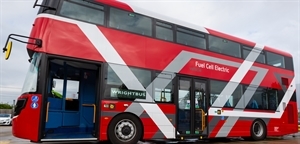Wrightbus owner proposes production of 3,000-strong hydrogen bus fleet
Tue 28 April 2020
View all news

The new owner of Northern Ireland's Wrightbus whose group also owns a hydrogen-production company, Ryse, has announced proposals to build a 3,000-strong hydrogen bus fleet across the UK.
The grandson of the founder of JCB, Jo Bamford - who bought Wrightbus last year - says that a hydrogen fleet could help support the UK economy as we emerge from the Coronavirus pandemic and make a positive environmental impact. The UK has around 30,000 buses so the hydrogen bus proposals would represent 10% of the total fleet.
Bamford has asked the Government to set aside £500m of its proposed £5bn funding package for buses outside London to “unlock the UK’s hydrogen industry.”
Wrightbus has already produced the world's first hydrogen double decker bus.
Wrightbus' sister company Ryse is building a hydrogen production plant on the Kent coast which will be powered by an offshore wind farm and use electrolysis to produce hydrogen from water. Bamford says Ryse aims to build another four hydrogen production plants by 2025 which could provide enough energy for all 3,000 buses.
Jo Bamford said (quoted in LTT): “Cities around the world are seeing massive reductions in air pollution as many vehicles have been kept off the road during the pandemic,” said Bamford.
“However, the reality is that if we just go back to how public transport has traditionally been run, levels of pollution will quickly rise again to the same levels as before the crisis. We have an opportunity with hydrogen powered transport to make a huge difference to air quality, and for UK jobs as well.”
Bamford says the vehicles, which would all be built at Wrightbus's Ballymena factory, could be operating in UK towns and cities by 2024.
Of the request for £500m Government support, around £200m would be spent on building hydrogen production facilities and zero-emission transport vehicles to take the fuel to depots, and £300m to subsidise the construction and purchase of the buses. Hydrogen would be supplied at below the price of diesel under the plans.
Mr Bamford says that, if supported, the plan will boost UK manufacturing while improving air quality and reducing carbon emissions. It would also lead to a widespread adoption of hydrogen as a fuel in other heavy-duty road vehicles and trains, he says.
Related Links
< Back to news list